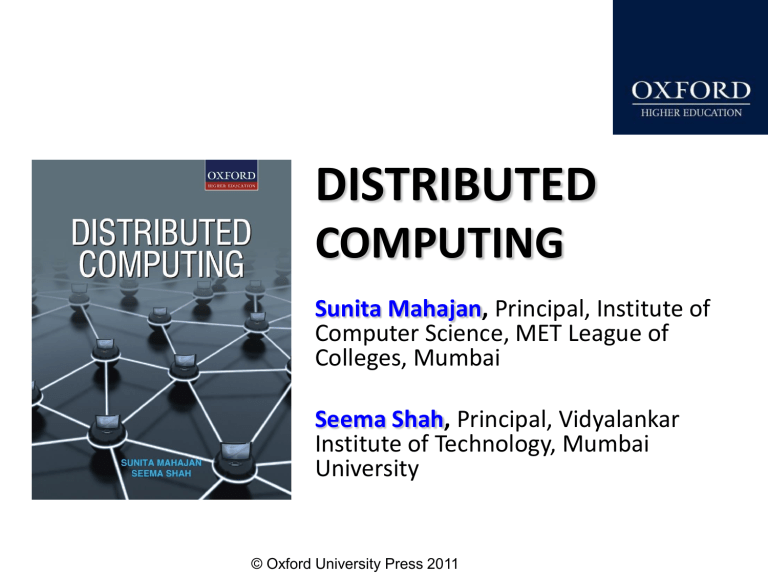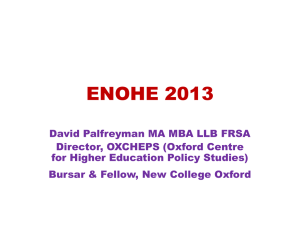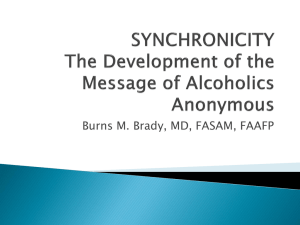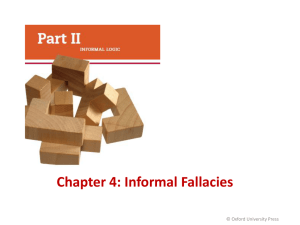File

DISTRIBUTED
COMPUTING
Sunita Mahajan , Principal, Institute of
Computer Science, MET League of
Colleges, Mumbai
Seema Shah , Principal, Vidyalankar
Institute of Technology, Mumbai
University
© Oxford University Press 2011
Chapter - 3
Interprocess Communication
© Oxford University Press 2011
Topics
• Message Passing
• Case Study: IPC in MACH
• Group communication
• Case Study: CBCAST protocol in ISIS
© Oxford University Press 2011
Message Passing
© Oxford University Press 2011
Message Passing vs Shared Memory
© Oxford University Press 2011
Desirable Features of Message
Passing Systems
• Hardware approach
• Functionality
• Performance
• Uniform semantics
• Efficiency
• Reliability
• Correctness
• Flexibility
• Portability
• Security
© Oxford University Press 2011
Message passing process
© Oxford University Press 2011
IPC message format
© Oxford University Press 2011
IPC Message
© Oxford University Press 2011
IPC synchronization
• Ensure message is received in the buffer:
– Polling-:periodically checking buffer
– Interrupt:- sending software interrupt
• Message communication techniques
– Synchronous communication
– Asynchronous communication
© Oxford University Press 2011
IPC: Synchronous communication
© Oxford University Press 2011
IPC: Asynchronous communication
© Oxford University Press 2011
IPC primitives
© Oxford University Press 2011
Message buffering strategies
© Oxford University Press 2011
Null buffering
© Oxford University Press 2011
Null buffering with blocked receiver
© Oxford University Press 2011
Null buffering with non blocked receiver
© Oxford University Press 2011
Message buffering: single buffer
© Oxford University Press 2011
Message buffering: multiple message buffer
• Receiver overflow handled using:
– Unsuccessful communication indication
– Flow control mechanism
© Oxford University Press 2011
Multidatagram messaging
• Concept of MTU
• Message sequencing and reassembly
• Message contents
• Message representation: tagged, untagged
© Oxford University Press 2011
Message data transmission
© Oxford University Press 2011
Process addressing techniques
• Explicit addressing :send (process_id, message) and receive (process_id, message)
• Implicit addressing:send_any (service_id,
message) and receive_any (service_id, message)
– Two level addressing : machine_id@local_id (receiver machine name)
– Three level addressing: machine_id@local_id@machine_id . (Node where the process was created @ generated by the first machine@ last known location of the machine)
© Oxford University Press 2011
Link-based Process Addressing
© Oxford University Press 2011
Failure handling mechanism
• IPC problems due to system failures
© Oxford University Press 2011
IPC Protocols
• 4-message reliable IPC protocol
• 3-message reliable IPC protocol
• 2-message reliable IPC protocol
© Oxford University Press 2011
IPC 4 message protocol
© Oxford University Press 2011
IPC 3 message protocol
© Oxford University Press 2011
IPC 2 message protocol
© Oxford University Press 2011
IPC Failure
© Oxford University Press 2011
Case Study: IPC in MACH
© Oxford University Press 2011
Case Study: IPC in MACH
• MACH IPC Components
– Ports
– Messages
• Message format
• NetMsgServer
© Oxford University Press 2011
MACH message format
© Oxford University Press 2011
Group communication
© Oxford University Press 2011
Group Communication
• Unicast –one to one communication
• Many-to-one group communication
• One-to-many or multicast group communication
© Oxford University Press 2011
Unicast group communication
© Oxford University Press 2011
Many to one communication
© Oxford University Press 2011
Multi cast communication
Broadcast communication
© Oxford University Press 2011
Types of Groups
• Closed group
• Open group
• Peer group
• Hierarchical group
© Oxford University Press 2011
Group management
• Centralized approach
• Distributed approach
© Oxford University Press 2011
Group addressing Message delivery
• High level naming
• For large LANs/ MANs: send message to individual group members
• Send to all semantics
• Bulletin board semantics
© Oxford University Press 2011
Reliability mechanism
• Classified based on number of receivers from which sender expects a response
© Oxford University Press 2011
Message ordering
© Oxford University Press 2011
Message ordering: Absolute Ordering
© Oxford University Press 2011
Message ordering: Consistent ordering
© Oxford University Press 2011
Message ordering: Causal ordering
© Oxford University Press 2011
Case Study: CBCAST protocol in ISIS
© Oxford University Press 2011
CBCAST protocol
• S: vector of the sending process attached to the message
• R : vector of the receiving process
• i: sequence number of the sender process
• Runtime system tests following conditions
– S[i] = R [i] + 1
– S[j] <= R[j] for j <> i
© Oxford University Press 2011
CBCAST protocol in ISIS
© Oxford University Press 2011
Summary
• Message Passing
• Case Study: IPC in MACH
• Group communication
• Case Study: CBCAST protocol in ISIS
© Oxford University Press 2011








